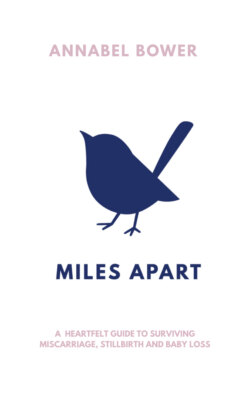Miles Apart

Реклама. ООО «ЛитРес», ИНН: 7719571260.
Оглавление
Annabel Bower. Miles Apart
A note about terminology
Introduction
Chapter 1 My Family
Chapter 2 When four becomes five
Chapter 3 The cherry on top
Chapter 4 A devastating diagnosis
Chapter 5 A ‘decision’ that is not a choice
Chapter 6 Preparing for the worst imaginable thing
Chapter 7 Saying hello and goodbye in the same moment
Chapter 8 The taboo topic of baby loss
Chapter 9 Baby loss in early pregnancy
Chapter 10 Miscarriage, Eleanor’s story
Chapter 11 A little life, not a little loss
Chapter 12 Best practice for early pregnancy loss
Chapter 13 TFMR the last taboo
Chapter 14 Delivering your baby
Chapter 15 Getting to know grief and what it’s really like
Chapter 16 Grieving and feeling alone
Chapter 17 How to announce your loss
Chapter 18 Having a funeral or a memorial
Chapter 19 For the love of Lucia: loss in infancy
Chapter 20 How the reactions of others can affect you
Chapter 21 How to begin moving through grief
Chapter 22 Grief is a rollercoaster
Chapter 23 Losing more than just your baby
Chapter 24 Fear of being perceived as too absorbed in grief
Chapter 25 Guilt and anger
Chapter 26 Stillbirth, Elke and Emma's story
Chapter 27 Deciding to have another baby
Chapter 28 Deciding not to have another baby or not being able to
Chapter 29 Embryo Loss, by Nama Winston
Chapter 30 Ectopic pregnancy and Endometriosis - Keira's story
Chapter 31 Dealing with other people’s pregnancies and babies after baby loss
Chapter 32 Significant dates and anniversaries
Chapter 33 Ways of remembering and honouring your baby
Chapter 34 What not to say
‘It’s really common’
Anecdotes that don’t involve first-hand experience
‘Are you feeling better?’
‘Time heals all wounds’
Complaining about newborns
Other people’s birth and pregnancy stories
Stories of complicated deliveries
Inferring blame for your baby’s death
Stories that mean to empathise, but have no relation to your experience
Suggesting it was ‘God’s will’ or somehow destined to happen
‘Count your blessings’
‘At least you know you can get pregnant’
‘It could have been worse’
Using medical terms to refer to your baby
Random strange comments
People avoiding conversation with you, or mention of your baby
Common hurtful comments (a loss mothers’ list)
Chapter 35 What to say and do for the bereaved
Report your sad news on your behalf
Organise outings for or respite from older children
Everyday errands
Help with funeral or memorial
Advice for loss parents: accept help
Make a meal
Messages and gifts
Message that explicitly say ‘no pressure to respond’
Share your own experiences with baby loss, if you have them
Ask to see pictures of the baby who has been lost
Acknowledge significant milestones
Offer to come to appointments as moral support
Donate to baby loss charities or similar
Use the lost baby’s name
Share baby loss reading
Acknowledge the loss
Show your own emotions about the loss
Invite conversations about the baby who has been lost
Chapter 36 Grieving differently to those close to you
Chapter 37 A partner’s perspective
Chapter 38 Miles apart, forever in your heart
Where to turn next: A checklist
Thank you
Отрывок из книги
First of all I want you to know that you will survive this. You probably don’t believe me, or think that it is possible, but please have faith that one day, you will smile again. The loss of a baby is achingly sad, life changing and shocking. I think most people are completely blindsided, their world abruptly turned upside down by the realisation that their precious baby will not be coming home with them. In the blink of an eye, what is supposed to be a happy, life-giving experience becomes one of utter heartbreak. Perhaps you woke up one morning full of hope, your head and heart full of dreams for the future, a future that involved the exact child you were carrying. You were excited to be off to a scan to see your baby, or your mind was occupied by this special news that you were yet to share with others. By day’s end, that excitement had evaporated, your heart was broken and your innocent bubble of happiness had abruptly burst.
We first learned of Miles’ condition amidst an ordinary morning’s chaos. It never occurred to me that by afternoon, our world would be devastated. During the scan where we first received the bad news about our baby’s condition, I thought, No, not us. This can’t be happening. I thought it had to be a bad dream, a nightmare. Was it something I’d done wrong during the pregnancy, something I’d eaten? Or was it down to my age and doing too much?
.....
As a society, we need to normalise how we talk about baby loss at any stage of pregnancy, to lift the stigma and open up the conversations that should follow baby loss. Early pregnancy loss remains hidden in the shadows because it is considered to be relatively common. This seems absurd: statistics do not alter grief or its intensity.
We live in a world obsessed with pregnancy and babies. Women are often asked if they have children before what they do for work or pleasure. Pregnancy is publicly celebrated with social media announcements, gender reveals and baby showers. Conversely, pregnancy loss is kept in the dark: brushed aside or not spoken of. To go from one side of the equation to the other in an incredibly short space of time is traumatic. One minute, people are asking, how are you feeling?, when is the baby due?, do you know what you’re having? But when a baby dies, people can be unsure of what to say or do. Sometimes they completely ignore the fact that your baby died, heightening your isolation.
.....